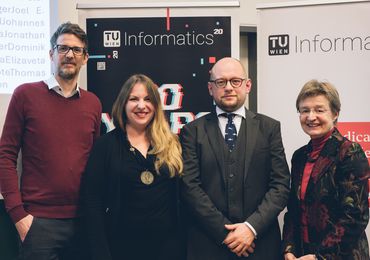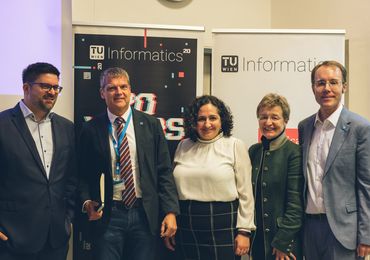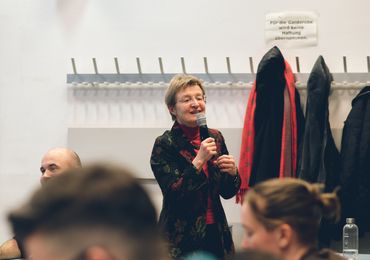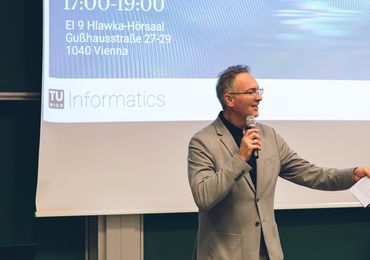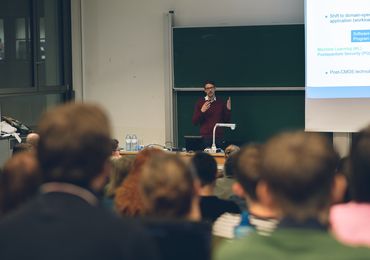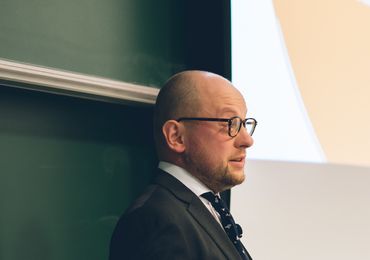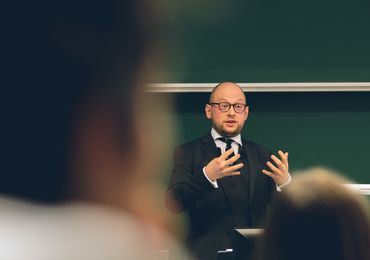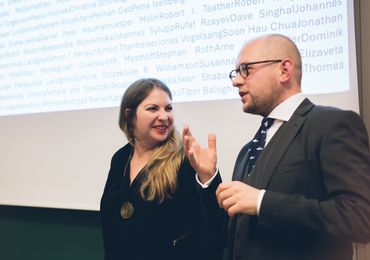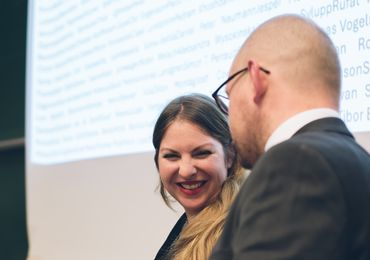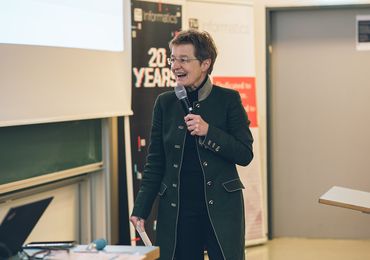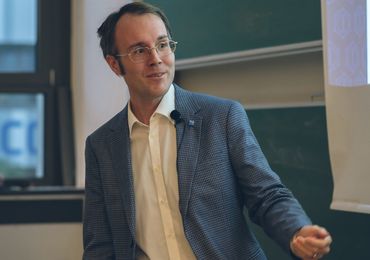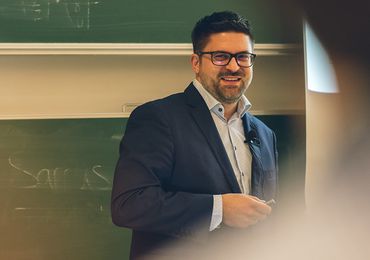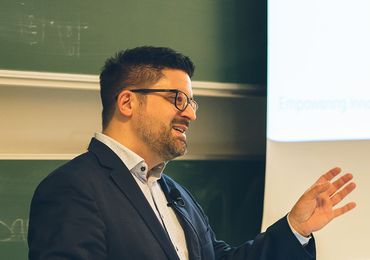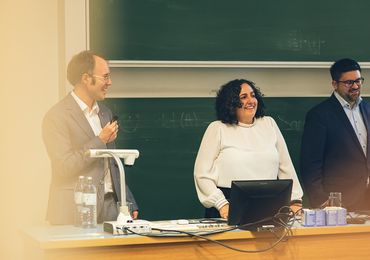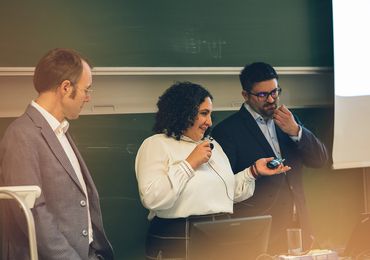Inaugural Lectures 2024
In October and November, we had the pleasure of officially welcoming our new Professors to the faculty at their Inaugural Lectures.

About
On October 15 and November 12, we had the pleasure of officially welcoming six new Professors to our faculty: Jessica Cauchard, Daniel Müller-Gritschneder, Magdalena Ortiz, Emanuel Sallinger, Dominique Schröder, and Paweł W. Woźniak. After welcome addresses by TU Wien Rector Jens Schneider and Vice-Rector Peter Ertl, as well as an introduction by our Dean Gerti Kappel, each of our new Professors presented what’s at the heart of their research and work. All six lectures illustrated the diversity of research areas and foci in the field of computer science, with topics ranging from Knowledge Representation and Reasoning (KRR), Scalability in computer science and Neurosymbolic Artificial Intelligence (AI), Privacy Enhancing Technologies, fostering seamless interactions between humans and machines, the design of custom-tailored, safe, and secure RISC-V processors, to questions in the field of Human-Computer-Interaction that are explored through interactive technologies designed for physical activities.
In the first lecture on October 15, Magdalena Ortiz explored one of the most ambitious and exciting ideas that have driven Artificial Intelligence (AI) since its early days: The explicit representation of human knowledge and the drawing of inferences from it by means of automated reasoning. Her lecture highlighted that despite recent progress, knowledge-based rational inference remains very hard to reproduce in machines and the challenges to achieving transparent and accurate AI systems that can be trusted even in unforeseen circumstances and that can be explained in human-understandable terms.
The second lecture that evening held by Emanuel Sallinger, addressed the challenges of making AI systems scalable in terms of speed, complexity as well as sustainability. He offered an overview of these aspects and illustrated them in one of his major areas of research, Knowledge Graphs. In this research area, there is a need for large real-world graphs with very complex knowledge and a need for clear explanations, with sustainability as a key concern and a possible area of application at the same time. He shared insights from real-world examples of his work, like the Central Bank of Italy, and gave an outlook of what’s still to come at the intersection of data management, data science, and AI.
The last lecture on October 15 was held by Dominique Schröder, whose research focus lies on privacy-enhancing technologies. The lecture was centered around the rapid growth of data collection and advances in AI that make data processing more efficient. Privacy, in this context, is often seen as problematic, on belief being that “I have nothing to hide,” which leads people to dismiss privacy concerns. Another misconception that Dominique Schröder brought up is that privacy hinders technological progress, as an obstacle to innovation in areas such as AI. In this lecture, he addressed both misconceptions and showed how technologies like encrypted communications and differential privacy in data analysis enable innovation without violating individual privacy.
The Inaugural Lectures of our new Professors continued on November 12, where Jessica Cauchard started into the evening by presenting her research and vision on facilitating seamless human-machine interaction. Her lecture focused on divergent visions of the future that emerge with machines becoming more and more autonomous. One key feature of fostering positive futures is for intelligent systems to understand human contexts, and for humans to be able to interpret machine behavior, with the success of this endeavor depending on meaningful interaction between humans and machines. Through a series of projects, Jessica Cauchard explored how human-centered approaches can enhance communication between humans and machines and how design methods can be harnessed to leverage the understanding of complex systems.
Following Jessica Cauchard, Daniel Müller-Gritschneder talked about his research on Rapid Prototype Methods for RISC-V processors. While many Machine Learning (ML) models run in large data centers, others are moving to the so-called computing edge, powering applications like driver assistance in cars or activity recognition in wearables. However, the energy demands of ML workloads challenge the battery lifetime of edge devices, and new computing systems with energy-efficient ML computations, as well as strict security and safety standards, are required. The open RISC-V instruction set architecture (ISA) is a key enabler of future computing systems, with its modular design allowing for custom processing instructions tailored to specific workloads. However, designing safe, secure, and efficient processors for these tasks remains a challenge. To address these issues, Daniel Müller-Gritschneder presented his research on pre-silicon simulators, rapid prototyping, and fast safety evaluations to develop custom RISC-V processors that meet the demands of energy efficiency, security, and performance.
The last Inaugural Lecture was held by Paweł W. Woźniak, who was examining how we can deepen our understanding of technology to ensure that it benefits its users. With a focus on interactive technology designed for physical activity, he explored how our relationship with technology is shaped, and at the center of the lecture stood questions like whether machines can perceive or empathize with us, what possibilities they bring, and what challenges there are in terms of feelings of intrusion or discomfort. Understanding tensions that might arise with these technologies is crucial for interaction design, as the field of Human-Computer-Interaction is not solely about creating devices but about examining their impact on the human experience.
Each lecture provided valuable insights into the diverse world of computer science, exploring both the opportunities and the challenges of our time, and they emphasized the critical role of research and innovation in creating technology for people. After the lectures, the audience had the opportunity to bring their questions to our new Professors in a Q&A session and the evening closed with the opportunity to mingle, exchange ideas, and network with staff, students, and faculty members.
Curious about our new Professors? Check out their abstracts, academic bios, and interviews below to learn more about their research!
Lectures
Jessica Cauchard
Links: #5QW Interview / Staff Page / Research Unit
Lecture “Fly Me to the Moon”
As machines become ever more autonomous, diverging visions emerge, from the realms of science and science fiction alike. Some imagine a glamorous future with virtual and physical agents devoted to humans, supporting our well-being and handling our every chore as we luxuriate; while others ponder whether humans will, instead, support robots and AI in daily tasks. To nurture optimistic visions of the future, we must facilitate seamless human-machine communication, as to enable the symbiotic integration of machines into human environments. This challenge can be addressed from a dual perspective, one of understanding and one of interaction.
Indeed, successful integration demands that intelligent systems grasp the intricacies and subtleties of human contexts, just as humans must interpret the actions and behaviors of machines. Furthermore, it hinges on the ability of humans and machines to engage with one another, both implicitly and explicitly, as they navigate the world together. Through a composition of projects, I will showcase how human-centered approaches foster the development of natural communication between humans and machines, and how design methods can be harnessed to leverage the understanding of complex systems. This ensemble will unveil opportunities for future technologies, unlocking groundbreaking applications – such as augmenting human abilities – and enabling coexistence between autonomous systems and us, humans.
About Jessica Cauchard
Jessica Cauchard is Professor of Artifact-based Computing and User Research at TU Wien Informatics. Her research is rooted in the fields of Human-Computer and Human-Robot Interaction with a focus on novel interaction techniques and ubiquitous computing. She is passionate about how technology is changing and how we interact with our world and with one another, and her research aims at designing intelligent systems that can co-exist with humans. Previously, she was a faculty member in the Department of Industrial Engineering and Management at Ben Gurion University of the Negev, where she founded and headed the Magic Lab, and in the Department of Computer Science at Reichman University, Israel. Dr. Cauchard received her PhD in Computer Science at the University of Bristol, UK, in 2014 and worked as a postdoctoral scholar at Cornell Tech and Stanford University, USA.
Daniel Müller Gritschneder
Links: #5QW Interview / Staff Page / Research Unit
Lecture “Rapid Prototyping Methods for custom-tailored, safe and secure RISC-V processors”
Machine Learning, generally known as Artificial Intelligence (AI), has gained a lot of attention recently with new services becoming available such as ChatGPT or DeepML. These large language models are trained and executed usually in large data center environments. Yet in parallel, ML models such as vision systems are also moving to the so-called computing edge into cars (e.g., advanced driver assistance systems such as lane keeping and automatic parking) or wearables (e.g., activity recognition in smart watches using accelerometers). These edge devices often operate on batteries such that the immense energy hunger of ML workloads challenges their battery lifetime. Hence, new computing systems are required that offer energy-efficient ML computations at the edge. Next to ML, these systems also have to adhere to strict security and safety standards if they are operated in critical environments, e.g., in automotive or industrial settings.
A rising star that is shaping future computing processor systems is the open RISC-V instruction set architecture (ISA). RISC-V processors are implemented by a growing number of commercial chip developments and are a major driver for democratizing chip design by enabling open-source hardware projects. A main feature of RISC-V is its in-build support for adding your own processing instructions in a modular fashion, which opens a vast design space to custom-tailor your RISC-V processor to specific workloads such as ML computation. But a key question remains – how to find the right processor for the given computational workload and ensure it is safe and secure? To tackle this challenge, I investigate pre-silicon simulators, rapid prototyping methods, and fast safety evaluation methods. I will give an overview of our techniques as well as outline how we enable the design of custom-tailored, safe, and secure RISC-V processors for future computing systems. ped techniques and present results for state-of-the-art, open-source RISC-V processors.
About Daniel Müller-Gritschneder
Daniel Müller-Gritschneder is Professor of Computer Architecture at the Institute of Computer Engineering at TU Wien Informatics. He received his Diploma, doctoral, and habilitation degree in electrical engineering and information technology from TU Munich, where he was also a researcher at the Chair of Electronic Design Automation between 2004 and 2024. He worked on several projects in close cooperation with industry partners such as Infineon, Intel, Siemens and Bosch. He serves as a TPC member at EDA conferences such as DAC, ICCAD, SAMOS, and CODES/ISSS and was co-organizer of the RISC-V Summit Europe 23 and 24. He is also a senior member of IEEEE. His main interests are in Electronic System Level Design, RISC-V, tinyML as well as functional safety and HW security.
Magdalena Ortiz
Links: #5QW Interview / Staff Page / Research Unit
Lecture “Pushing the Boundaries of Rational AI”
One of the most ambitious and exciting ideas that has driven AI since its early days is the explicit representation of human knowledge and the drawing of inferences from it by means of automated reasoning. We are witnessing a new AI era where large-scale learning from vast quantities of data has enabled the simulation of increasingly sophisticated human-like behaviors. But despite all the recent progress, knowledge-based rational inference remains very hard to reproduce in machines.
Due to the subtle intricacies of human reasoning and the high computational cost of inference from vast amounts of knowledge, there are still many challenges to achieving a transparent and accurate AI that can be trusted even in unforeseen circumstances, and that can be explained in human-understandable terms. The field of Knowledge Representation and Reasoning has developed a rich toolkit of techniques that enable rational inference, leveraging different types of knowledge, accommodating various domain assumptions, and supporting increasingly complex information needs.
As we better understand different requirements and gain a better grasp of the fine balance between the expressiveness of languages and the cost of computation, we can now provide tailored solutions that support the desired decision-making at a minimal computational cost, making it feasible to build increasingly intelligent systems: An AI that does not require extensive training to improve its ability to make accurate predictions, as it can logically reach correct conclusions.
About Magdalena Ortiz
Magdalena Ortiz is Professor of Knowledge Representation and Reasoning at the Institute of Logic and Computation at TU Wien Informatics. She is known for her research on logic-based AI, including description logics and ontologies, knowledge graphs, and knowledge-enriched data management. Her research aims to develop formal methods for understanding, representing, and accessing complex information, particularly in the context of AI systems that can reason and make decisions based on explicit knowledge. She serves on the editorial boards and program committees of numerous leading AI journals and conferences and is engaged in the organization of significant AI education initiatives in Europe.
Emanuel Sallinger
Links: #5QW Interview / Staff Page / Research Unit
Lecture “Scalable AI: From Scalable Data Management to Neurosymbolic AI”
Scalability in computer science is often associated with speed. Speed is one important aspect of Artificial Intelligence, but not the only one. We do not only want answers from our AI systems, but we also want explanations of these answers. With growing input sizes, can explanations scale so that they remain useful to us as humans? Second, we need our AI systems to be sustainable – so scale down the resource usage and still give good results. Third, we need AI systems to scale with growing complexity – in my research related to Knowledge Graphs, this is often associated with complexity measures of large graphs and expressive knowledge. Solving these challenges individually is not enough. We need AI systems that jointly scale on all their core components. On the one hand, this is scalable data management, allowing effective access to data. On the other hand, this is joint scalability in the two main AI families: sub-symbolic AI – that is machine learning including LLMs – and symbolic AI – including logical reasoning. This combination is typically called bilateral or neurosymbolic AI.
Getting all three parts closely working together is not easy, but it is crucial. In my lecture, I will give an overview of these aspects and illustrate them in one of my major areas of research, Knowledge Graphs, where we have a need for all the above: Extremely large real-world graphs with very complex knowledge, the need for clear explanations, and sustainability as a key concern and application at the same time. To achieve this, we need scalable graph data management and both sub-symbolic AI methods such as Knowledge Graph Embeddings, Graph Neural Networks, and LLMs – and symbolic AI methods such as Datalog- and Vadalog-based reasoning.
I will give real-world examples of my work in these areas, like the work with our partners at the Central Bank of Italy, and an outlook and vision of what comes next at the intersection of data management, data science, and Artificial Intelligence.
About Emanuel Sallinger
Emanuel Sallinger is Professor of Databases and Artificial Intelligence and Vice Dean of Academic Affairs for Business Informatics and Data Science at TU Wien Informatics. Prior to that, he directed the VADA Lab at the University of Oxford. He holds a PhD in Computer Science, a master’s degree in Computational Intelligence and Informatics Management, and a Bachelor’s degree in Software & Information Engineering. He is a Senior Fellow of the Higher Education Academy (SFHEA).
Emanuel Sallinger is head of the Knowledge Graph Lab at DBAI, a Vienna Research Group funded by the Vienna Science and Technology Fund (WWTF). He also leads the SIG Knowledge Graphs of the Center for AI and ML (CAIML) at TU Wien. His research interests are in scalable data management and artificial intelligence technologies, especially those connecting theory to practice. This particularly includes approaches connecting symbolic AI – logical reasoning – and subsymbolic AI, i.e., machine learning including LLMs. His focus lies on Knowledge Graphs and scalable reasoning in such systems, both in terms of knowledge-based/logic-based reasoning and machine learning-based reasoning.
Dominique Schröder
Links: #5QW Interview / Staff Page / Research Unit
Lecture “Empowering Innovation: Unlocking the Potential of Privacy-Enhancing Technologies”
Data collection is growing rapidly due to the increasing number of connected devices, from smartphones to smart home systems, and advances in artificial intelligence that make data processing more efficient. Businesses and governments are collecting data to enhance decision-making, improve services, and create personalized experiences. For example, smart healthcare can monitor patients remotely, connected devices can optimize energy use, and smart cities can reduce traffic congestion. However, this data collection raises privacy concerns, such as the risk of sensitive health data being exposed, devices recording conversations without consent, and personal data being shared with third parties.
Privacy is often seen as a problem or unnecessary because of common prejudices. One is the belief that “I have nothing to hide,” which leads people to dismiss privacy concerns as irrelevant to them personally. Another misconception is that privacy hinders technological progress, with some seeing it as an obstacle to innovation in areas such as AI, smart devices, or personalized services. In this talk, I will address both misconceptions. First, I will show how even small pieces of information can uniquely track and identify individuals, proving that privacy concerns affect everyone, not just those with “something to hide”. Second, I will show how privacy-enhancing technologies enable modern advances without violating individual privacy. From encrypted communications to differential privacy in data analysis, these tools allow us to innovate while protecting personal information at the same time, proving that privacy and technological progress can coexist.
About Dominique Schröder
Magdalena Ortiz is Professor of Knowledge Representation and Reasoning at the Institute of Logic and Computation at TU Wien Informatics. She is known for her research on logic-based AI, including description logics and ontologies, knowledge graphs, and knowledge-enriched data management. Her research aims to develop formal methods for understanding, representing, and accessing complex information, particularly in the context of AI systems that can reason and make decisions based on explicit knowledge. She serves on the editorial boards and program committees of numerous leading AI journals and conferences and is engaged in the organization of significant AI education initiatives in Europe.
Paweł W. Woźniak
Links: #5QW Interview / Staff Page / Research Unit
Lecture “Active Bodies, Perceptive Machines: How Everyday Interactions Reveal Profound Questions in HCI”
In this lecture, I will explore what fascinates me about the field of Human-Computer Interaction (HCI), especially as technology becomes an increasingly integral part of our everyday lives. I will examine how we can deepen our understanding of technology to ensure it genuinely benefits its users. I will start by focusing on one of my preferred areas of interactive technology: those designed for physical activity. These technologies, while appearing straightforward, often raise profound questions about the future of our relationship with technology.
This exploration leads to intriguing considerations—can technology become conscious? Could it one day ‘perceive’ our physical state or even empathize with us? However, these exciting possibilities come at a cost. What happens when technology crosses personal boundaries, becoming intrusive or unsettling? I suggest that a deeper understanding of how technology causes ambiguous feelings is key for the future of interaction design. Ultimately, I hope to demonstrate that HCI is not only about designing devices and interfaces but also about understanding their broader impact on the human experience.
About Paweł W. Woźniak
Paweł W. Woźniak is Professor and Head of Research Unit Human Computer Interaction (HCI) at TU Wien Informatics. Previously, he was an associate professor of Interaction Design at Chalmers University of Technology, an assistant professor of Human-Centred Computing at Utrecht University, and a postdoctoral fellow at the Chair for Human-Computer Interaction and Socio-Cognitive Systems at the University of Stuttgart. He received his PhD degree in Human-Computer Interaction from Chalmers in 2016. His key interests lie in the intersection of technologies, sport, and well-being. His focus is on understanding the everyday experiences of physical activity to design better technologies that support well-being. To this end, he conducts studies in personal informatics, building an understanding of how users gather, process, and reflect upon data in their lives. Paweł Woźniak loves to build stuff and he builds devices for sports particularly often. He also conducts research in multi-surface interactions, augmenting sensory perception and creepy experiences of interactive technologies. He has received numerous paper awards (CHI, MobileHCI, EICS) and assumed multiple roles of trust in the academic community (general chair of TEI'23, ISS'21, SIGCHI Poland Chair).

